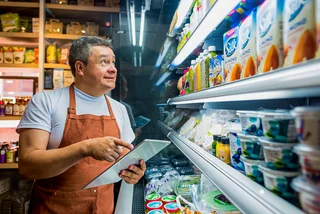Despite concerns that food prices may rise at the beginning of 2024, major supermarket chains in the Czech Republic have assured customers that they have taken steps to account for these changes and that prices would stay down. However, although the value-added tax (VAT) rate for food has dropped from 15 to 12 percent, consumers say that they don’t see a price decrease, either.
Czech news source ČT24 notes that representatives from various supermarket chains confirm that they have fully reflected the reduced VAT rate in the prices of over 8,500 products. According to spokespeople from these chains, the prices of meat, baked goods, dairy products, fruits, vegetables, pasta, rice, and flour have all decreased. However, some sellers argue that the final prices did not account for the fall in VAT.
HOW PRICES ARE LOOKING
- Potatoes - Up 28.5 percent year on year
- Pork - Down 0.8 percent
- Eggs - Down 25.5 percent
- Sugar - Down 18.6 percent
- Alcohol - Up 0.5 percent
Year-on-year prices of foods in Czechia, November 2023 (latest available data). Source: Czech Statistical Office
Only time will tell if goods become cheaper
Speaking on Czech Television, Czech Minister of Agriculture Marek Výborný says that not “it is too early” to see any tangible decrease and food prices, but told consumers that this would happen in the coming months. Chairman of the Association of Czech Traditional Trade Pavel Březina similarly said that traders needed some time to adjust their prices appropriately.
President of the Trade and Tourism Association Tomáš Prouza pointed out that prices of suppliers will become cheaper in 2024, which will in turn make goods cheaper for traders. Ultimately, this will mean that the consumer pays less money.
Capitalinked analyst Radim Dohnal expects that the current adjustments to VAT rates could start a competitive battle between supermarkets. "I think their margins will be smaller in the long term than they were last year. They probably got scared of the state and maybe they think that new competition will come," he said.
Soft drinks are set to see a rise in price, as the VAT rate for all non-alcoholic drinks has now increased from 15 to 21 percentage points. The VAT for baby food has also increased, from 10 to 12 percent.
A way to compare prices
Shops are still rejecting Výborný’s proposal to create an official food price comparison tool that would present prices among all major chains. At the same time, representatives of farmers and food producers made it clear that they would like such an idea.
Výborný has made it clear that he does not intend to give up his idea, but he needs the cooperation of the stores to do so. "The only way would be to give an order from the law – such as via a decree or regulation. But I would be happy if we could come to an agreement," he noted.
It will likely take until mid-February, when the Czech Statistical Office releases its inflation and consumer price data for the month of January, to see whether food prices finally become cheaper for the average consumer in Czechia.












 Reading time: 2 minutes
Reading time: 2 minutes 



























